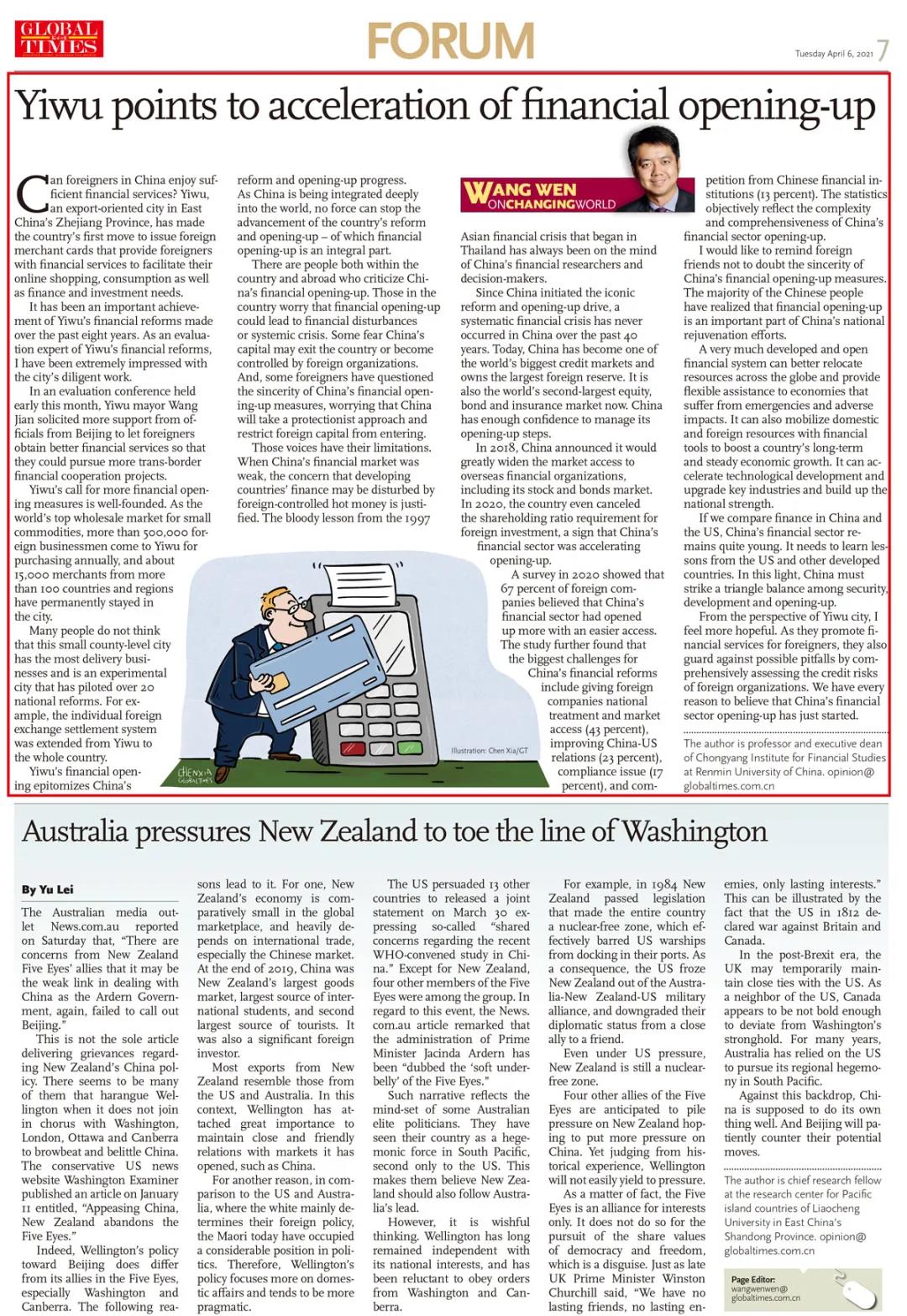中国人民大学与加拿大女王大学金融硕士聚焦 | 王文:中国金融开放刚开始
来源:人大重阳(rdcy2013)
在《环球时报英文版》4月6日刊发的第76篇“变局”专栏中,中国人民大学重阳金融研究院执行院长王文表示,中国金融开放必须保持安全、发展与开放之间的“三角平衡”。不要怀疑中国金融开放的诚意,中国金融开放才刚刚开始。下文为专栏的中英文版。
在《环球时报英文版》4月6日刊发的第76篇“变局”专栏中,中国人民大学重阳金融研究院执行院长王文表示,中国金融开放必须保持安全、发展与开放之间的“三角平衡”。不要怀疑中国金融开放的诚意,中国金融开放才刚刚开始。下文为专栏的中英文版。

老外在中国,是否能够享受足够的金融服务?义乌,浙江中部的小县城,率全国之先,推进“外籍商友卡”,为外国人的线上购物、消费缴费、投资理财等提供金融服务。这是义乌金融改革八年来的一项重要成果。作为义乌金改的评估专家,这项工作让我印象深刻。
在4月初的评估会上,义乌市长王健恳请来自北京的官员给予更多授权,比如支持外籍人员获得金融服务的国民待遇,谋划更多跨境金融合作项目等等。
义乌金融开放的呼吁是相当迫切的。作为世界小商品之都,每年有超过50万人次的境外客商来义乌采购,有来自100多个国家和地区的1.5万名境外客商常驻义乌。很多人没有想到,这个小县城还是中国快递业务量最多的城市,是20多项国家级改革试点的城市,比如个人贸易结汇业务,就是由义乌推广至全国。
义乌的金融开放是中国对外开放政策的缩影。中国越来越融入世界,没有人能阻止开放政策的推进,而金融开放恰恰是开放政策的核心。
国内外都有一批人批评中国的金融开放。国内有人担心金融开放,将导致更大的金融动荡甚至危机,也将使中国资本外流或被外国资本控制。而国外的一些人则怀疑中国金融开放的诚意,认为中国将长期采取保护主义,限制外国资本的进入。
这些批判的声音,都带有时代的局限性。中国金融市场相对弱小时,当然害怕重蹈发展中国家被外国金融大鳄搅局的风险,1997年源于泰国的亚洲金融危机像血一般的教训,悬在中国金融研究与决策者的案头。
改革开放以来,中国40多年未发生系统性的金融危机,与这种审慎密不可分。现在,中国成为世界最大规模的信贷市场和外汇储备,还拥有世界第二大的股票市场、债券市场和保险市场,中国有足够的自信与底气,更大的开放便成为必然的选项。
2018年,中国宣布要在金融领域大幅度放宽市场准入,之后又出台更多相关具体措施。2020年,金融业对外资的所有股比限制全部取消,中国金融领域对外开放进程持续提速。
2020年的一项调查数据显示,67%外资机构认为,中国金融开放程度有所提升。27%认为,没有明显改善。仅有6%认为开放程度有所下降。中国金融开放面临的具体挑战最大的依次为,“国民待遇和市场准入”(43%)、中美关系日益紧张(23%)、合规风险(17%)、中国其他金融机构的竞争(13%)。这些数据很客观地反映了目前金融开放的复杂性与综合度。
我希望这篇专栏能提醒外国朋友的是,不要怀疑中国金融开放的诚意。中国主流人群的理念是统一的。大家都充分认识到,金融开放是民族复兴过程中的重要路径。发达与开放的金融系统,有利于在全球范围内进行资源配置,可以为遭受意外或不利冲击的经济体提供流动性,帮助渡过难关、平滑消费。还可以通过金融工具调动国内外资源,促进经济长期稳定增长,加快技术进步和关键性的产业升级,从而加速国家实力的增长和民族复兴目标的实现。
外资仅占中国保险业市场6%,证券市场约3%,银行市场约1%,空间还是相当之大,但不得不说,中国金融开放需要更多的时间积累。1990年代初,上海与深圳证券交易所才成立,比纽约证券交易所晚了200年。2009年人民币正式开始国际化的进程,比美元国际化晚了约140年。
从中美金融比较的角度看,中国是相当年轻的国家,仍需要向美国学习,当然也需要汲取美国的教训。中国金融开放必须保持安全、发展与开放之间的“三角平衡”。在许多发展中国家来看,这更像是“不可能的三角”。
从义乌身上,我感受到了更大的希望。他们在推动外国人的金融服务同时,也坚持防范风险,要求综合评估入境人员的信用与风险可能性。渐进式的推动,正在缓慢打开更大变局的序幕。有理由相信,中国金融开放才刚刚开始。
以下为英文版
Yiwu points to acceleration of financial opening-up
By Wang Wen

Illustration: Chen Xia/GT
Can foreigners in China enjoy sufficient financial services? Yiwu, an export-oriented city in East China's Zhejiang Province, has made the country's first move to issue foreign merchant cards that provide foreigners with financial services to facilitate their online shopping, consumption as well as finance and investment needs.
It has been an important achievement of Yiwu's financial reforms made over the past eight years. As an evaluation expert of Yiwu's financial reforms, I have been extremely impressed with the city's diligent work.
In an evaluation conference held early this month, Yiwu mayor Wang Jian solicited more support from officials from Beijing to let foreigners obtain better financial services so that they could pursue more trans-border financial cooperation projects.
Yiwu's call for more financial opening measures is well-founded. As the world's top wholesale market for small commodities, more than 500,000 foreign businessmen come to Yiwu for purchasing annually, and about 15,000 merchants from more than 100 countries and regions have permanently stayed in the city.
Many people do not think that this small county-level city has the most delivery businesses and is an experimental city that has piloted over 20 national reforms. For example, the individual foreign exchange settlement system was extended from Yiwu to the whole country.
Yiwu's financial opening epitomizes China's reform and opening-up progress. As China is being integrated deeply into the world, no force can stop the advancement of the country's reform and opening-up - of which financial opening-up is an integral part.
There are people both within the country and abroad who criticize China's financial opening-up. Those in the country worry that financial opening-up could lead to financial disturbances or systemic crisis. Some fear China's capital may exit the country or become controlled by foreign organizations. And, some foreigners have questioned the sincerity of China's financial opening-up measures, worrying that China will take a protectionist approach and restrict foreign capital from entering.
Those voices have their limitations. When China's financial market was weak, the concern that developing countries' finance may be disturbed by foreign-controlled hot money is justified. The bloody lesson from the 1997 Asian financial crisis that began in Thailand has always been on the mind of China's financial researchers and decision-makers.
Since China initiated the iconic reform and opening-up drive, a systematic financial crisis has never occurred in China over the past 40 years. Today, China has become one of the world's biggest credit markets and owns the largest foreign reserve. It is also the world's second-largest equity, bond and insurance market now. China has enough confidence to manage its opening-up steps.
In 2018, China announced it would greatly widen the market access to overseas financial organizations, including its stock and bonds market. In 2020, the country even canceled the shareholding ratio requirement for foreign investment, a sign that China's financial sector was accelerating opening-up.
A survey in 2020 showed that 67 percent of foreign companies believed that China's financial sector had opened up more with an easier access. The study further found that the biggest challenges for China's financial reforms include giving foreign companies national treatment and market access (43 percent), improving China-US relations (23 percent), compliance issue (17 percent), and competition from Chinese financial institutions (13 percent). The statistics objectively reflect the complexity and comprehensiveness of China's financial sector opening-up.
I would like to remind foreign friends not to doubt the sincerity of China's financial opening-up measures. The majority of the Chinese people have realized that financial opening-up is an important part of China's national rejuvenation efforts.
A very much developed and open financial system can better relocate resources across the globe and provide flexible assistance to economies that suffer from emergencies and adverse impacts. It can also mobilize domestic and foreign resources with financial tools to boost a country's long-term and steady economic growth. It can accelerate technological development and upgrade key industries and build up the national strength.
If we compare finance in China and the US, China's financial sector remains quite young. It needs to learn lessons from the US and other developed countries. In this light, China must strike a triangle balance among security, development and opening-up.
From the perspective of Yiwu city, I feel more hopeful. As they promote financial services for foreigners, they also guard against possible pitfalls by comprehensively assessing the credit risks of foreign organizations. We have every reason to believe that China's financial sector opening-up has just started.
(The author is professor and executive dean of Chongyang Institute for Financial Studies at Renmin University of China.)
注:随着中国在世界经济格局影响力的不断增强,国内金融市场在全球化、自由化、工程化和资产证券化等方面得到了迅猛的发展。这些变化对金融专业人士了解中国市场兼具国际视野的素质提出了更高的要求。
与此同时,为了在新环境下保持和发展企业竞争优势,明尚夙达的经理人和企业管理者对学习金融相关业务的知识结构、管理方法、融入全球化发展战略产生了迫切的需求。
2013年8月,由中国人民大学汉青经济与金融高级研究院与加拿大女王大学史密斯商学院联合举办的国际级金融硕士学位项目获得教育部批准,成为中国人民大学金融学科领域第一个获得教育部批准的中外合作办学项目。